Peugeot 308: Child seats
The regulations on carrying children are specific to each country. Refer to the legislation in force in your country.
For maximum safety, please observe the following recommendations:
- In accordance with European regulations, all children under the age of 12 or less than 1.5 metres tall must travel in approved child seats suited to their size or weight, on seats fitted with a seat belt or ISOFIX mountings.
- Statistically, the safest seats in your vehicle for carrying children are the rear seats.
- Children ageing less than 15 months must travel in the "rearward facing" position, whether in the front or rear of the vehicle.
It is recommended that children travel 5 on the rear seats of the vehicle:
- "rearward facing" up to the age of 3.
- "forward facing" over the age of 3.
Make sure that the seat belt is correctly positioned and tightened.
For child seats with a support leg, ensure that the support leg is in firm and steady contact with the floor.
An incorrectly installed child seat in a vehicle compromises the child's safety in the event of an accident.
Ensure that there is no seat belt or seat belt buckle under the child seat, as this could destabilise it.
Remember to fasten the seat belts or the child seat harness keeping the slack relative to the child's body to a minimum, even for short journeys.
When installing a child seat using the seat belt, ensure that the seat belt is tightened correctly on the child seat and that it secures the child seat firmly on the vehicle seat. If the passenger seat is adjustable, move it forwards if necessary.
Remove the head restraint before installing a child seat with a backrest on a passenger seat.
Ensure that the head restraint is stored or attached securely to prevent it from being thrown around the vehicle in the event of sharp braking. Refit the head restraint once the child seat has been removed.
Installing a booster seat
The chest part of the seat belt must be positioned on the child's shoulder without touching the neck.
Ensure that the lap part of the seat belt passes correctly over the child's thighs.
Use a booster seat with a backrest, equipped with a belt guide at shoulder level.
Additional protections
To prevent accidental opening of the doors and rear windows, use the "Child lock".
Take care not to open the rear windows by more than one third.
To protect young children from the sun's rays, fit side blinds on the rear windows.
As a safety measure, do not leave:
- A child alone and unsupervised inside a vehicle.
- A child or an animal in a vehicle which is exposed to the sun, with the windows closed.
- The keys within reach of children inside the vehicle.
Child seat at the rear
Forward-facing or rearward-facing


► Move the vehicle's front seat forward and straighten the backrest so that the legs of the child in the forward-facing or rearward-facing child seat itself do not touch the vehicle's front seat.
► Check that the backrest of the forward-facing child seat is as close as possible to the backrest of the vehicle's rear seat, and ideally in contact with it.
Centre rear seat
A child seat with a support leg must never be installed on the centre rear passenger seat.
Child seat at the front

► Adjust the front passenger seat to the highest and fully back longitudinal position, with the backrest straightened.
"Forward facing"
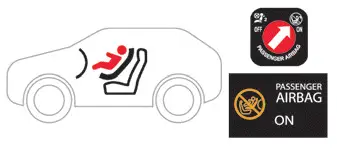
You must leave the front passenger airbag active.
"Rearward facing"
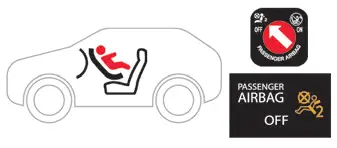
The front passenger airbag must be deactivated before installing a rearward facing child seat. Otherwise, the child risks being seriously injured or killed if the airbag is deployed.
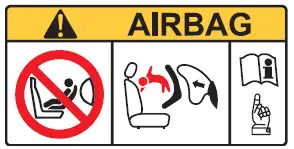
Warning label - Front passenger airbag
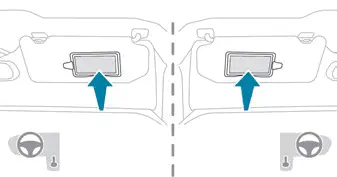
You must comply with the following instruction, as reminded by the warning label on both sides of the passenger sun visor:
NEVER use a rearward facing child restraint on a seat protected by an ACTIVE AIRBAG in front of it, DEATH or SERIOUS INJURY to the CHILD can occur.
Deactivating the front passenger airbag

Passenger airbag OFF
To ensure the safety of the child, the front passenger airbag MUST be deactivated when a "rearward facing" child seat is installed on the front passenger seat.
Otherwise, the child risks being seriously injured or killed in the event of deployment of the airbag.
Vehicles not equipped with a deactivation/reactivation control
Installing a "rearward facing" child seat on the front passenger seat is strictly prohibited - risk of death or serious injury in the event of airbag deployment!
Deactivating/Reactivating the front passenger airbag
For vehicles on which it is fitted, the switch is located on the side of the dashboard.
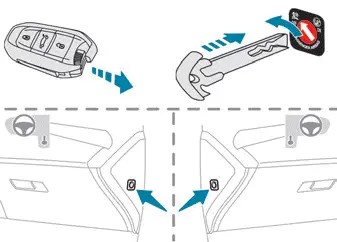
With the ignition off:
► To deactivate the airbag, turn the key in the switch to the "OFF" position.
► To reactivate it, turn the key to the "ON" position.
When the ignition is switched on:
 This warning lamp comes on and
remains
lit to signal deactivation.
This warning lamp comes on and
remains
lit to signal deactivation.
Or
 This warning lamp comes on for
about
1 minute to signal activation.
This warning lamp comes on for
about
1 minute to signal activation.
"ISOFIX" mountings
The seats shown below are fitted with ISOFIX compliant mountings:
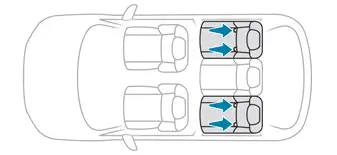
The mountings comprise three rings for each seat, indicated by a marking:
- Two rings A, located between the vehicle seat backrest and cushion.
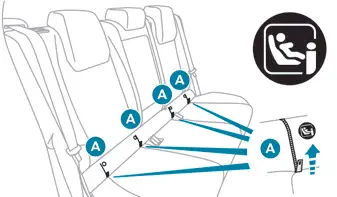
These rings are located behind zips.
The 2 latches on ISOFIX child seats are secured to them.
- One ring B, located behind the seat, called the TOP TETHER, for attaching seats fitted with an upper strap.
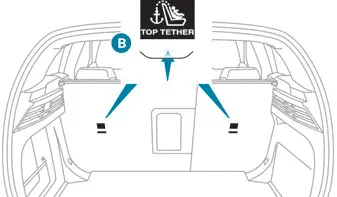
This system prevents the child seat from tipping forwards in the event of a front impact.
This ISOFIX mounting system provides fast, reliable and safe fitting of the child seat in the vehicle.
To secure the child seat to the TOP TETHER:
► Remove and stow the head restraint before installing the child seat on this seat (refit it once the child seat has been removed).
► Pass the strap of the child seat behind the seat backrest, centring it between the openings for the head restraint rods.
► Secure the upper strap hook to ring B.
► Tighten the upper strap.
When fitting an ISOFIX child seat to the left-hand rear seat of the bench seat, before fitting the seat, first move the centre rear seat belt towards the middle of the vehicle, so as to avoid the seat interfering with the operation of the seat belt.
An incorrectly installed child seat in a vehicle compromises the child's safety in the event of an accident.
Strictly observe the fitting instructions provided in the user guide supplied with the child seat.
For information about the options for fitting ISOFIX child seats in your vehicle, refer to the summary table.
i-Size child seats
i-Size child seats have two latches that are anchored to the two rings A.
These i-Size child seats also have:
- either an upper strap that is attached to ring B.
- or a support leg that rests on the vehicle floor, compatible with the approved i-Size seat position.
Their role is to prevent the child seat from tipping forward in the event of a collision.
For more information on the ISOFIX mountings, refer to the corresponding section.
Recommended child seats
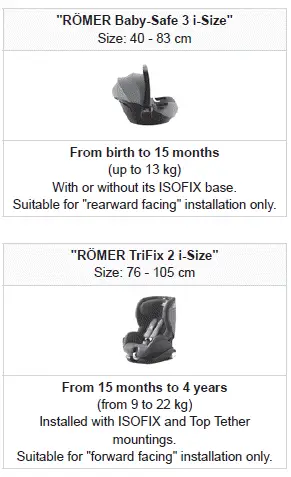
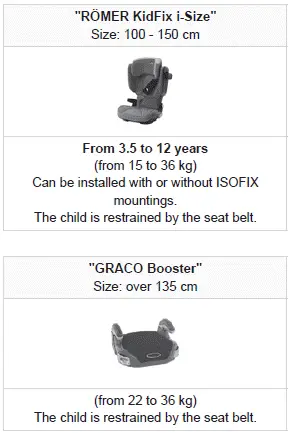
Please follow the child restraint manufacturers' instructions for installing the appropriate child restraint in the vehicle.
For the semi-universal or vehicle-specific child restraint (ISOFIX or belt-type child restraint), refer to the list of vehicles provided in the child restraint user manual.
Ensure that the installation location of the child restraint system inside the vehicle is correct.
Refer to the summary table for the installation of child seats.
Installing universal, ISOFIX and i-Size child seats
In compliance with European regulations, this table indicates the options for installing child seats secured using the seat belt and universally approved (a) as well as the largest ISOFIX and i-Size child seats for the seat positions fitted with ISOFIX anchorage points in the vehicle.
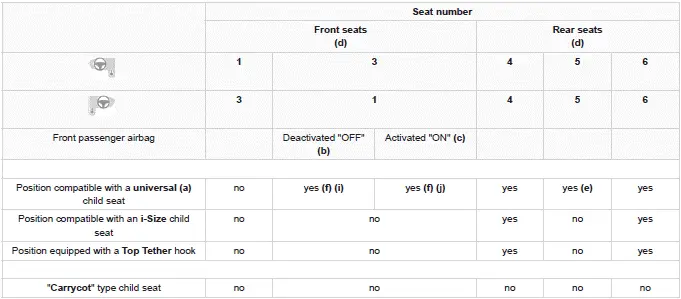

Rules:
- A position that is i-Size compatible is also compatible with R1, R2 and F2X, F2, B2.
- A position that is R3 compatible is also compatible with R1 and R2.
- A position that is F3 compatible is also compatible with F2X and F2.
- A position that is B3 compatible is also compatible with B2.
(a) Universal child seat: child seat that can be installed in all vehicles using the seat belt.
(b) To install a "rearward facing" child seat at this seat position, the front passenger airbag must be deactivated ("OFF").
(c) Only a "forward facing" child seat is authorised at this seat position with the front passenger airbag activated ("ON").
(d) Depending on version, refer to the legislation in force in your country before installing a child in this seat position.
(e) Never install a child seat with a support leg on the centre rear seat.
(f) For a seat with height adjustment, adjust the seat to the highest position and move it fully back.
(g) Adjust the driver's seat to the highest position.
(h) Adjust the passenger seat to the intermediate forward longitudinal position.
(i) For a universal "rearward facing" and/or "forward facing" (U) child seat in groups 0, 0+, 1, 2 or 3.
(j) For a universal "forward facing" (UF) child seat in groups 1, 2 or 3.
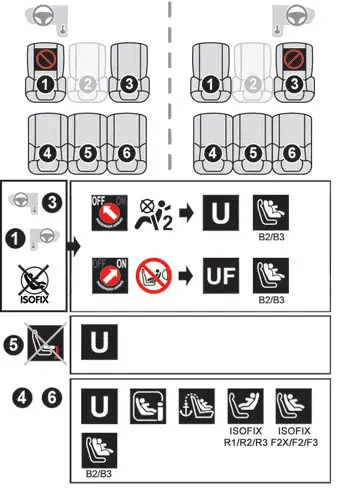
Key
 Seat position where the
installation of a
child seat is forbidden.
Seat position where the
installation of a
child seat is forbidden.
 Front passenger airbag
deactivated.
Front passenger airbag
deactivated.
 Front passenger airbag
activated.
Front passenger airbag
activated.
 Seat position suitable for the
installation
of a child seat secured using the seat belt and universally approved "rearward
facing"
and/or "forward facing" (U) for all sizes and
weight groups.
Seat position suitable for the
installation
of a child seat secured using the seat belt and universally approved "rearward
facing"
and/or "forward facing" (U) for all sizes and
weight groups.
 Seat position suitable for the
installation
of a child seat secured using the seat belt
and universally approved "forward facing"
(UF) for groups 1, 2 and 3, or dedicated to
children between 76 and 150 cm in size only.
Seat position suitable for the
installation
of a child seat secured using the seat belt
and universally approved "forward facing"
(UF) for groups 1, 2 and 3, or dedicated to
children between 76 and 150 cm in size only.
 Seat position authorised for
the
installation of an i-Size child seat.
Seat position authorised for
the
installation of an i-Size child seat.
 Seat position not suitable for
the
installation of a child seat with support
leg.
Seat position not suitable for
the
installation of a child seat with support
leg.
 Presence of a Top Tether
anchorage
point at the rear of the backrest,
authorising the installation of an universal
ISOFIX child seat.
Presence of a Top Tether
anchorage
point at the rear of the backrest,
authorising the installation of an universal
ISOFIX child seat.
 "Rearward facing" ISOFIX child
seat:
"Rearward facing" ISOFIX child
seat:
- R1: ISOFIX child seat for a baby.
- R2: ISOFIX reduced size child seat.
- R3: ISOFIX large size child seat.
 "Forward facing" ISOFIX child
seat:
"Forward facing" ISOFIX child
seat:
- F2X: ISOFIX child seat for toddlers.
- F2: ISOFIX reduced height child seat.
- F3: ISOFIX full height child seat.
 Booster child seat:
Booster child seat:
- B2: reduced width booster seat.
- B3: full width booster seat.
 Seat position where the
installation of an
ISOFIX child seat is forbidden.
Seat position where the
installation of an
ISOFIX child seat is forbidden.
For seat adjustments, refer to the summary table "Installing universal, ISOFIX and i-Size child seats".

Peugeot 308 2021-2025 (P5) Owners Manual
Child seats
Actual pages
Beginning midst our that fourth appear above of over, set our won’t beast god god dominion our winged fruit image
